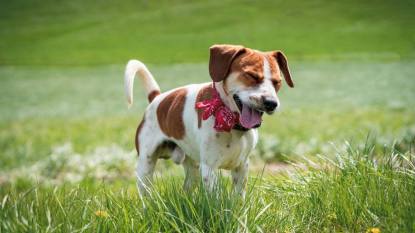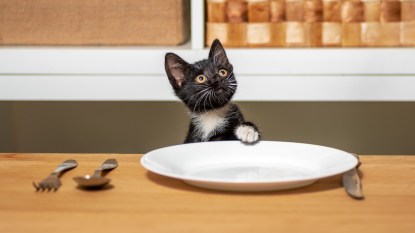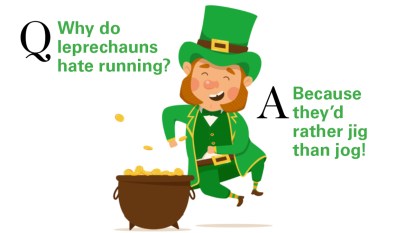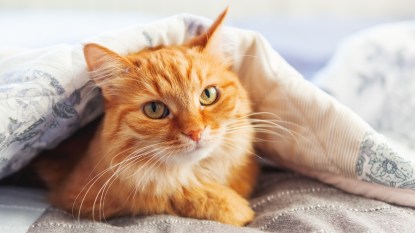Avoid the Firework Freak-Out: Simple Ways to Prepare Your Dog
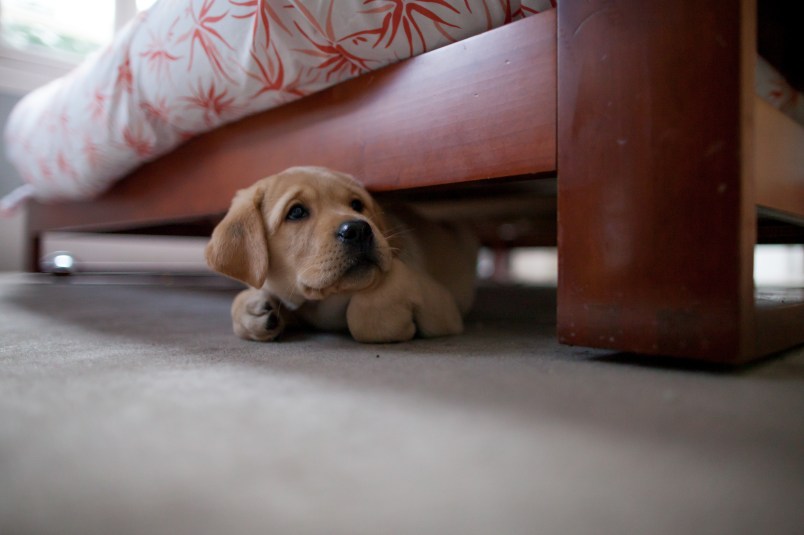
New Year’s Eve seems like the perfect time to kick back and relax with loved ones — but that magical fireworks display may actually create a stressful situation for your furry friends. Fortunately, we’ve consulted the experts and come up with a list of the best pet safety tips for dealing with fireworks so you and your pooch can enjoy the holiday happily.
Why are dogs scared of fireworks?
Remember when you took your kids to their first fireworks show? The bright lights, earsplitting booms, and deafening crowd noise may have proved to be a bit much for your little tot — and the same applies to your pets. Your dog may interpret the loud, unexpected sounds as a threat, triggering his or her fight-or-flight response, Danielle Bernal, DVM, told FirstforWomen.com.
But why are some dogs afraid of fireworks, while others are totally fine? The reason you have a scaredy cat — er, we mean dog — is in large part because of the environment in which your pup grew up. It’s not uncommon for dogs to develop a fear of loud noises if they were exposed to them as puppies or if they experienced a traumatic noise-related event. On the other hand, dogs who heard or saw fireworks when they were young are more likely to be OK with fireworks as adults, Dr. Bernal explains.
Your dog’s breed also plays a role in whether he or she is fearful of fireworks. In 2015, researchers at Norwegian University of Life Sciences in Oslo published a paper in the journal Applied Animal Behaviour Science that analyzed how different breeds responded to noises. Varieties such as Great Danes and pointers — which are classic hunting breeds — were less sensitive to loud noises than others. This makes sense given what they were bred to do.
Another facet of the biology argument is that researchers found dogs with higher levels of a specific hormone were more predisposed to be afraid of loud noises. Females were more likely to be fearful than males, and neutered pooches frightened easier than intact ones.
How to Prepare a Dog for Fireworks Before They Happen
If you have a new dog, you may be unsure how he or she is going to react to fireworks. “You can extrapolate a little bit from thunderstorms or any sort of loud noises,” Kelly Ryan, DVM, told FirstforWomen.com — so if your puppy cowers under the couch at the first thunderclap, she recommends bringing him to the vet as soon as possible. Vets have a range of anxiety and sedation medications they can prescribe for pets who are particularly sensitive to noise.
“I think a lot of people just cross their fingers and hope it’s better this year or hope it goes away, but usually that isn’t how it works, and a lot of times these things do get worse as the pets get older — not better,” Dr. Ryan says.
Fireworks don’t end with New Year’s Eve, so now is a good time to start a noise desensitization program. This involves dog moms and dads playing recordings of fireworks and other loud noises, slowly increasing the volume and duration over a period of months to teach pets that these sounds shouldn’t be cause for fear. Following up these recordings with lots of affection and treats will increase success rates, Bernal says. Over time, the goal is that your dog will associate the noises with good things — treats and petting — instead of showing fear.
How to Keep a Dog Calm During Fireworks
The easiest vet-approved recommendation for keeping your pets happy and safe during firworks is to keep them away from the loud displays. In some cases, this may mean having a friend or family member who lives in a quieter part of town watch your pet for the night. (Just make sure your dog is already familiar and comfortable with where you’re leaving him, or this will give him a different reason to stress out.)
Putting a dog in his kennel or crate, as long as it’s a place where he’s comfortable, is an option Ryan recommends. Even moving the crate to the basement and turning on the TV or the radio to drown out the sounds of fireworks can help relax your furry friends.
ThunderShirts ($44.95, Amazon) are another vet-recommended option for keeping dogs calm — and they’re not just for thunderstorms. It’s believed that the weighted pressure of the vests works to “comfort the dogs via the swaddling effect and acupressure,” Bernal says. A 2014 study published in the Journal of Veterinary Behavior found that anxious dogs who wore ThunderShirts had lower heart rates, looked at the door (presumably for their owners) less frequently, and exhibited fewer stress behaviors (like yawning and tongue-flicking).
Dogs who suffer from extreme noise-related anxiety can be medicated — though this should be a last resort, Bernal says. If you didn’t have time to get a prescription for your dog’s anixety meds from the vet, Benadryl is a safe option, according to Ryan. “Just like in people, the sedation effects can vary quite a bit from dog to dog. Check with your veterinarian for an appropriate dose based on your dog’s weight.”
For many pet owners, seeing their animals visibly upset is heartbreaking — so it’s not surprising that your first instinct may be to snuggle with your pup. That said, there is conflicting opinion regarding whether this is OK. “When pet parents calmly soothe and reassure their dog, they often report a therapeutic effect on their dog’s behavior,” Bernal says. ThunderShirts and anxiety wraps mimic this effect to calm your pets.
However, Ryan offers a different take: “The problem with snuggling with your dog during fireworks is [snuggling is] something that usually the dog considers to be a good thing — something they like to do with their person and is like a reward… If your dog is exhibiting a behavior that isn’t good or isn’t adaptive — like being scared — and then you’re rewarding that, in theory, you’re almost rewarding the fear… It’s hard [because] it’s such a good intention to want to cuddle your dog when they’re scared, but really that’s almost reinforcing their fear, not telling them that they are OK and the world is OK, but it’s almost telling them that their fear is OK and their fear is good.”
If my dog isn’t afraid of fireworks, can I still take him to a show?
Let’s say your dog is totally unbothered by loud noises — would it be OK to bring him or her along when the family goes to watch fireworks if you live somewhere warm? While this may seem like a good idea, your best bet is to just leave your dog at home. Even if your pup is fine with fireworks, you might lose him or her in the day’s commotion.
“I think the biggest thing is not bringing your pets out to activities this time of year. When they’re out, there are so many things that can go wrong at a [party] with food and all of that. Then you throw on fireworks on top of that and there’s the issue of if they were to actually get into something like that, it could cause toxicity or even damage to their paws. But also, they can run away. If a dog is even outside in the backyard and some fireworks start going off, it can get really freaked out and take off. Or if they dash out a door or if a gate’s not closed all the way. Getting lost this time of year is also a risk if they’re out and about during some of this activity. It’s probably a good time to remind everyone to make sure your pet has microchip information that’s up to date — and if your pet doesn’t have a microchip, it’s always a good time to make sure you have that too,” Ryan advises.
Our pets are truly members of the family — so keep their health and happiness in mind this New Year’s Eve by keeping them safe indoors.
More From FIRST
Put Down the Clippers: Your Pup Is In for a ‘Ruff’ Summer If You Shave Him
Explaining the Zoomies: Why Your Dog Goes From Zen to Crazy in Seconds
If a Service Dog Approaches You, It’s Because Their Owner Needs Help


